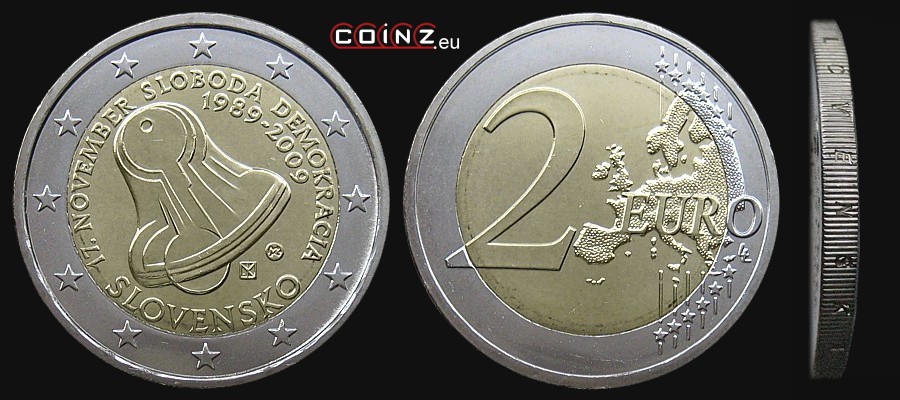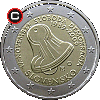2 euro SLOVAKIA (2009) 20th Anniversary of Velvet Revolution


| diameter: | weight: | thickness: | alloy: |
| 25.75 mm | 8.5 g | 2.22 mm | Cu75Ni25/Cu75Zn20Ni5 |
obverse:
in the coin centre a bell composed of door keys; along the bottom edge: SLOVENSKO (Slovakia); along the top edge in two lines:
17. NOVEMBER SLOBODA DEMOKRACIA / 1989-2009 (17th of November freedom democracy 1989-2009);
at the edge a ring of twelve five-pointed stars - symbol of the European Union
reverse:
edge:
reeded with concave inscription: 
SLOVENSKÁ REPUBLIKA (Slovak Republic and two five-pointed stars divided by a lime leaf)

SLOVENSKÁ REPUBLIKA (Slovak Republic and two five-pointed stars divided by a lime leaf)
issue date:
17 XI 2009
withdrawal date:
still in circulation
designer:
Pavel Károly (monogram below the bell on the obverse), Luc Luycx (initials LL below letter 'O' in EURO on the reverse)
mint:
 Mincovňa Kremnica (Kremnica Mint), Kremnica (mint mark below the bell on the obverse)
Mincovňa Kremnica (Kremnica Mint), Kremnica (mint mark below the bell on the obverse)
mintage:
| 2009 | 992 000 | + 8 000 in boxed coincards |
interesting facts:
The Velvet Revolution was the beginning of the end for the communist regime in Czechoslovakia. It begun on November 17, 1989
in Prague, the capital of Czechoslovakia, where the legal march in memory of a student murdered in 1939 changed spontaneously
into an illegal march against the Czechoslovak communist authorities. The crowd reached the central square of the capital city
(Václavské náměstí) and there people expressed their dissatisfaction by buzzing keys and ringing bells. The manifestation was
brutally pacified, however, three days later, the protesters returned to the same place in much greater numbers. Marches and
strikes in Czechoslovakia lasted ten days and they were actually the result of already successful revolutions in Poland, the
German Democratic Republic and Hungary. The general strike on November 27, which was attended by 75% of citizens finally forced
free elections in Czechoslovakia.
last update: 14 X 2012
coins catalogue :: katalog monet :: münzkatalog :: catalogue de monnaies :: catálogo de monedas :: catalogo monete :: каталог монет :: κέρματα κατάλογος :: COINZ.eu
© 2010-2025 :: Adam Kubicki :: COINZ.eu :: All rights reserved.


